|
Getting your Trinity Audio player ready... |
Tabla de Contenido/ Table of Contents
- 1 Miami International Airport – MIA Still in Crisis: Audit Reveals Legal Breaches, Infrastructure Deterioration Over Years, and Leadership Failures
- 1.1 I. Findings from the Operational Audit: Systemic Breaches
- 1.2 II. Infrastructure Crisis: An Airport on the Brink of Collapse
- 1.3 1. Multi-Billion Investment vs. Years of Neglect
- 1.4 2. Lack of Transparency in Contract Execution and Reporting
- 1.5 3. Skytrain Crisis and Delayed Response
- 1.6 4. Escalators, Elevators, and Restrooms in Poor Condition
- 1.7 5. Boarding Bridge Modernization with Excessive Delays
- 1.8 6. Bidding Processes and Expansion Projects with Unacceptable Completion Dates
- 1.9 Edificio 3090: An Invisible Electrical Hazard
- 1.10 III. Failed Governance: Leadership Inaction
- 1.11 IV. Crisis at Miami Airport: Questionable Contracts and Safety Risks
- 1.12 V. Consequences and Lessons Unlearned
- 1.13 Conclusion: An Airport, A Symbol of Mismanagement
- 1.14 Sources:
- 1.15 Key Errors Identified:
- 1.16 Urgent Recommendations:
- 1.17 Final Conclusion:
- 2 Miami-Dade County Mayor, Board of County Commissioners, and Miami-Dade Aviation Department Chief Executive Officer
- 3 MIAMI INTERNATIONAL AIRPORT PROCUREMENT, TRANSPARENCY, AND ACCOUNTABILITY
Miami International Airport – MIA Still in Crisis: Audit Reveals Legal Breaches, Infrastructure Deterioration Over Years, and Leadership Failures
A comprehensive analysis exposes how administrative negligence, lack of transparency, and political inaction have turned Miami International Airport into a case study in poor governance.
I. Findings from the Operational Audit: Systemic Breaches
Violated Legal Framework:
- Section 332.0075 (Florida Statutes): Non-compliance in publishing minutes, budgets, and contracts.
- Miami-Dade Ordinance 19-122: Failures in monthly capital project reports.
- Public Records Laws: Lack of transparency in $1.43 billion of unpublished contracts.
Key Results:
Broken Transparency:
- 22 contracts worth $560.9 million remained hidden for up to 1,002 days.
- 2023-24 budget published with a 15-day delay.
- Meeting minutes buried in external links, violating legal deadlines.
Ethics at Risk:
- 14 elected officials lacked mandatory annual ethics training.
- Purchasing agents failed to submit financial interest statements.
Delayed Response:
- Corrective measures only implemented after the audit (e.g., contract publications in April 2024).
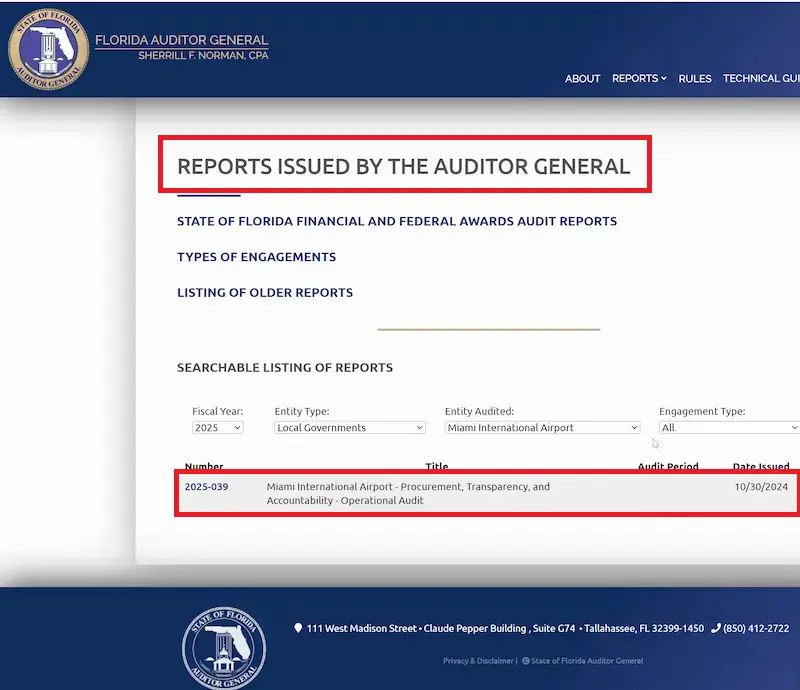
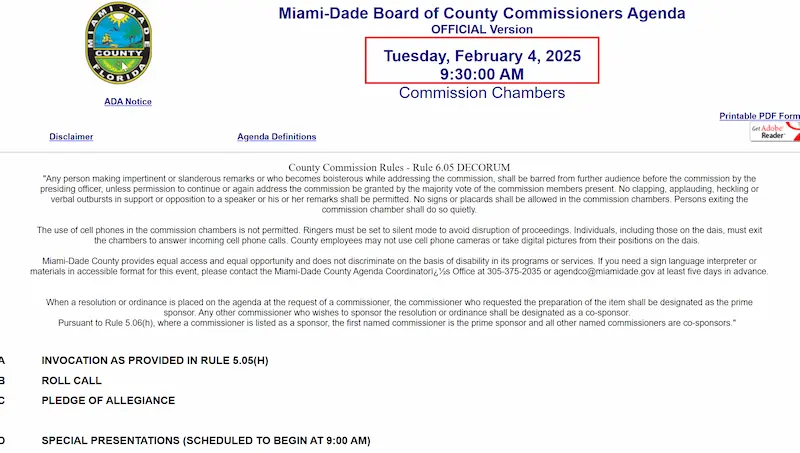
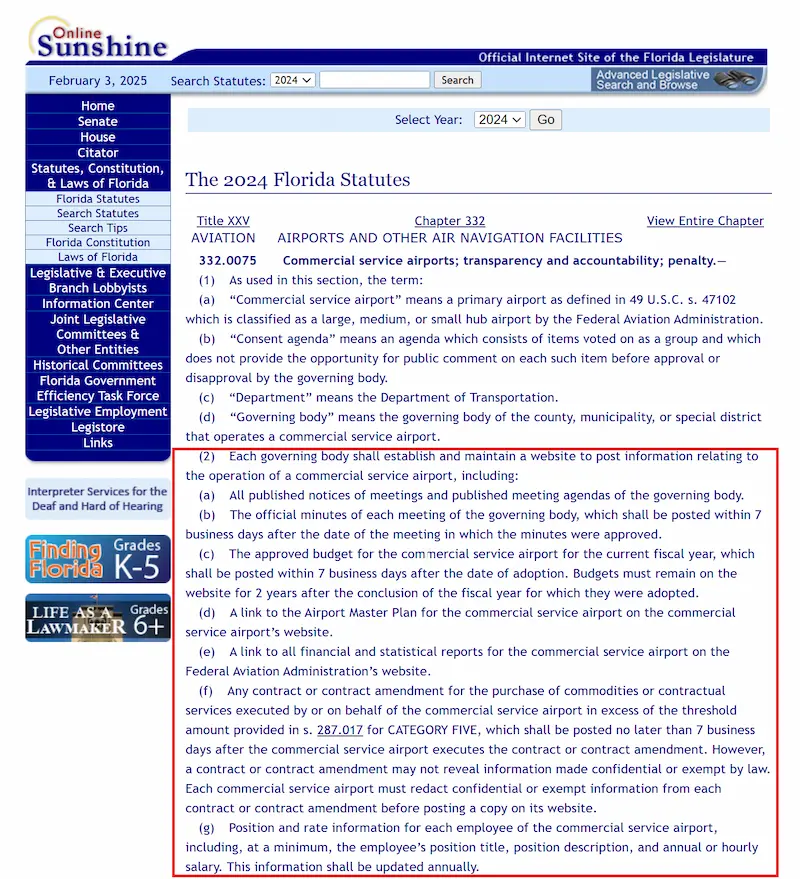
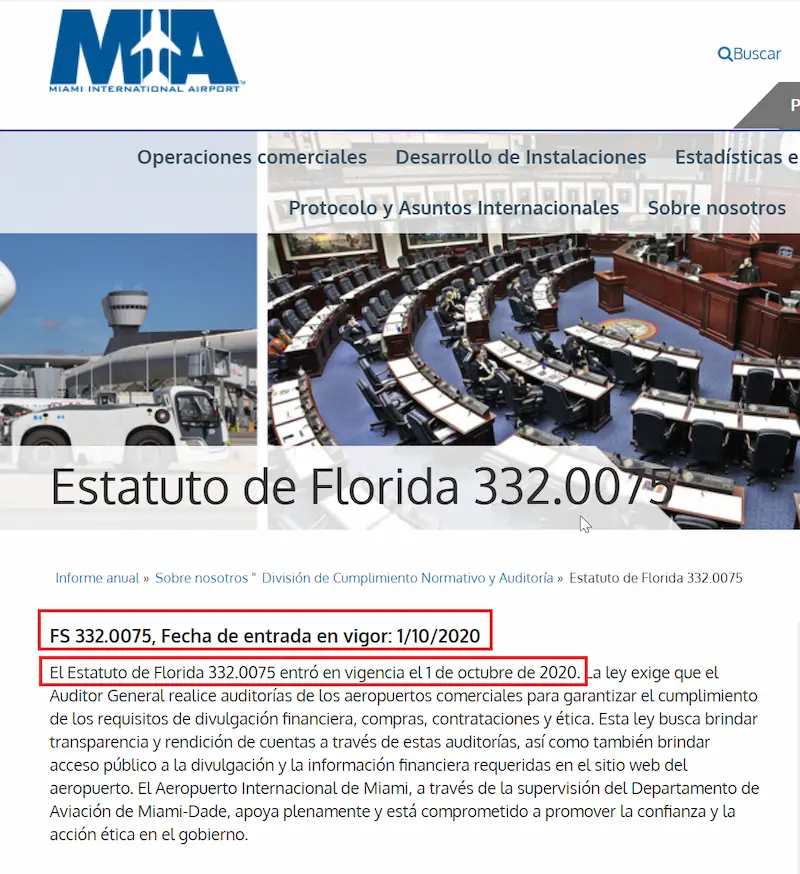
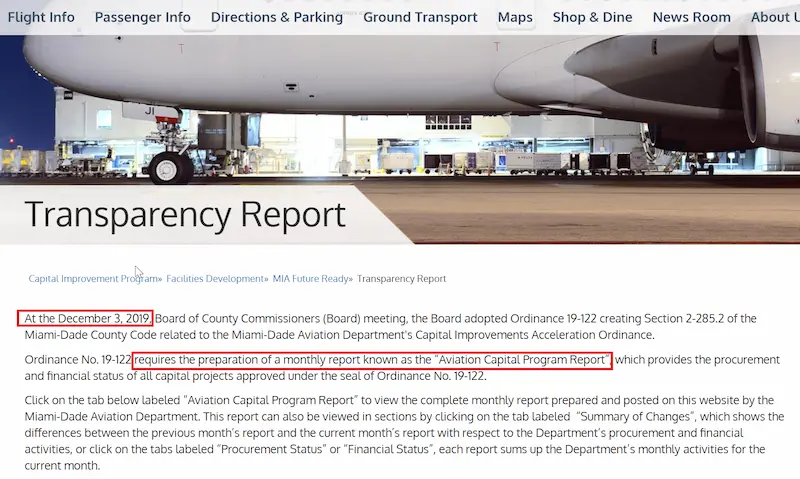

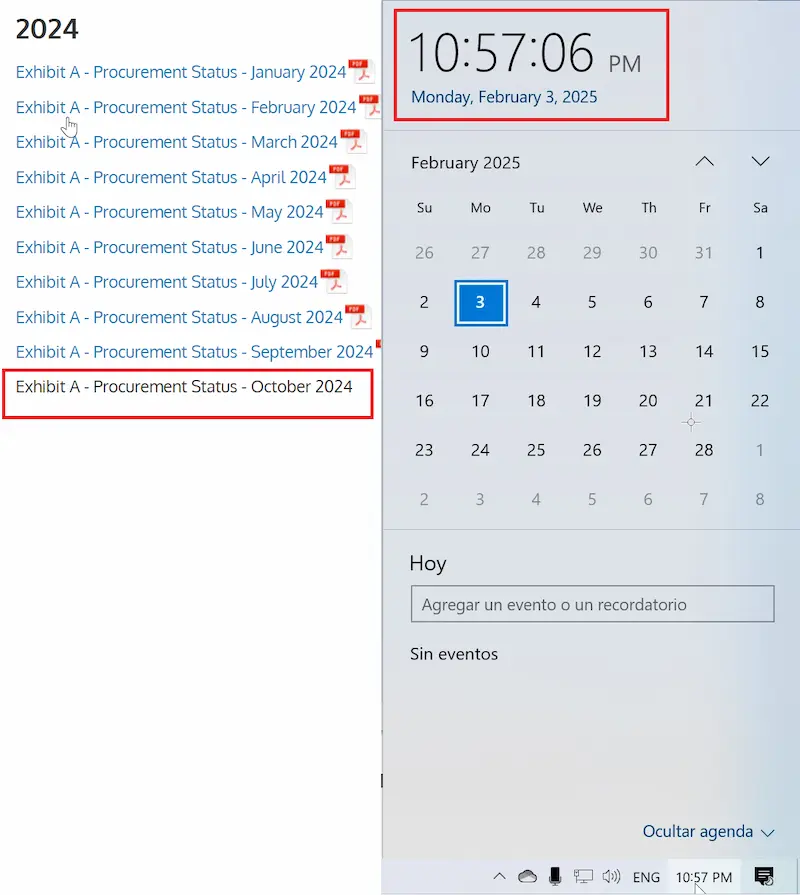
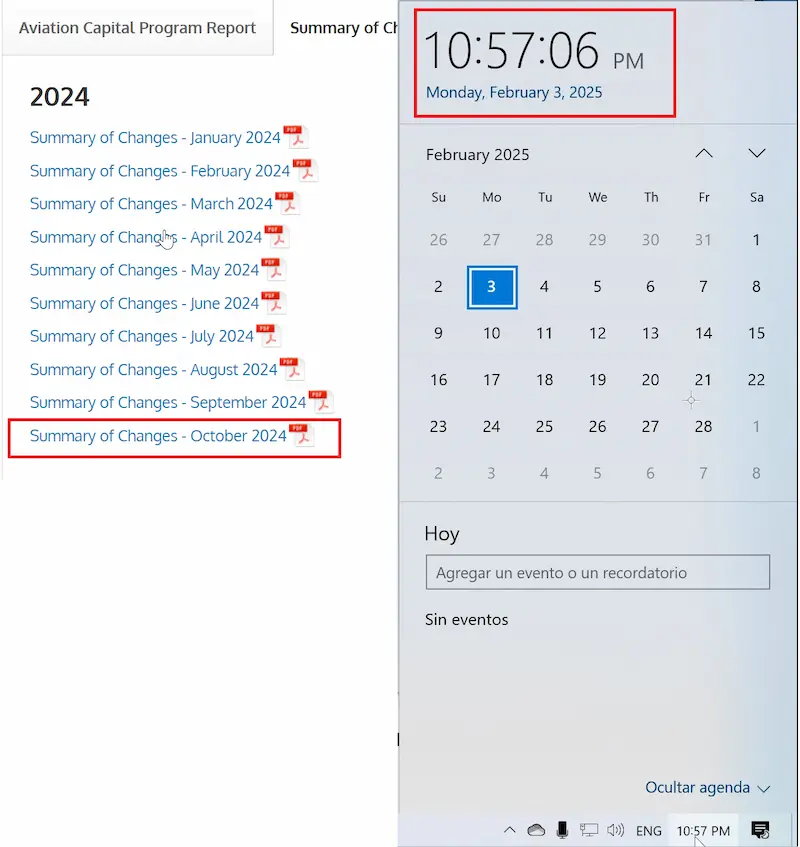
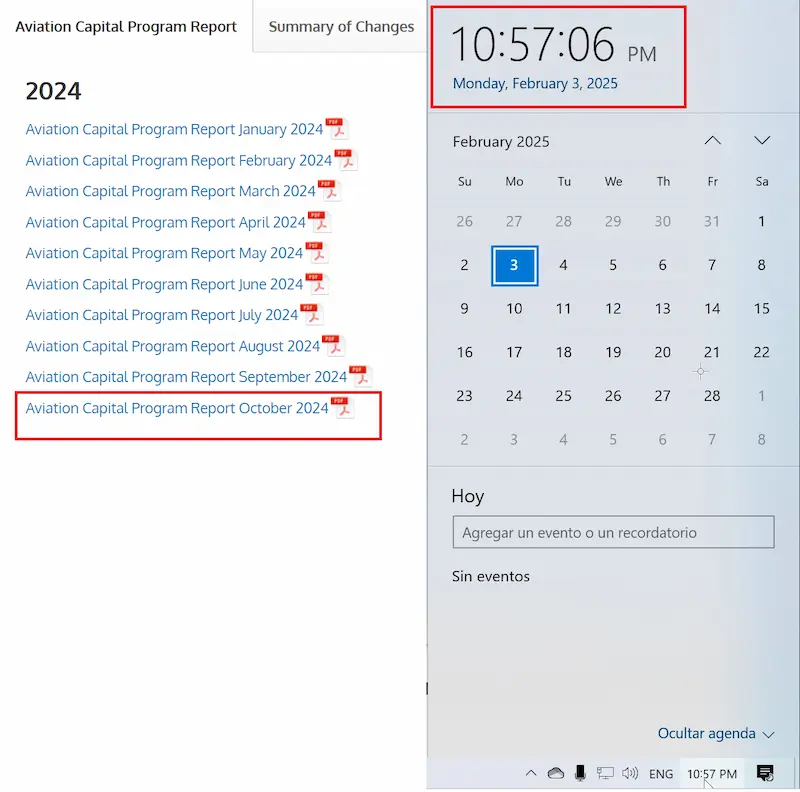
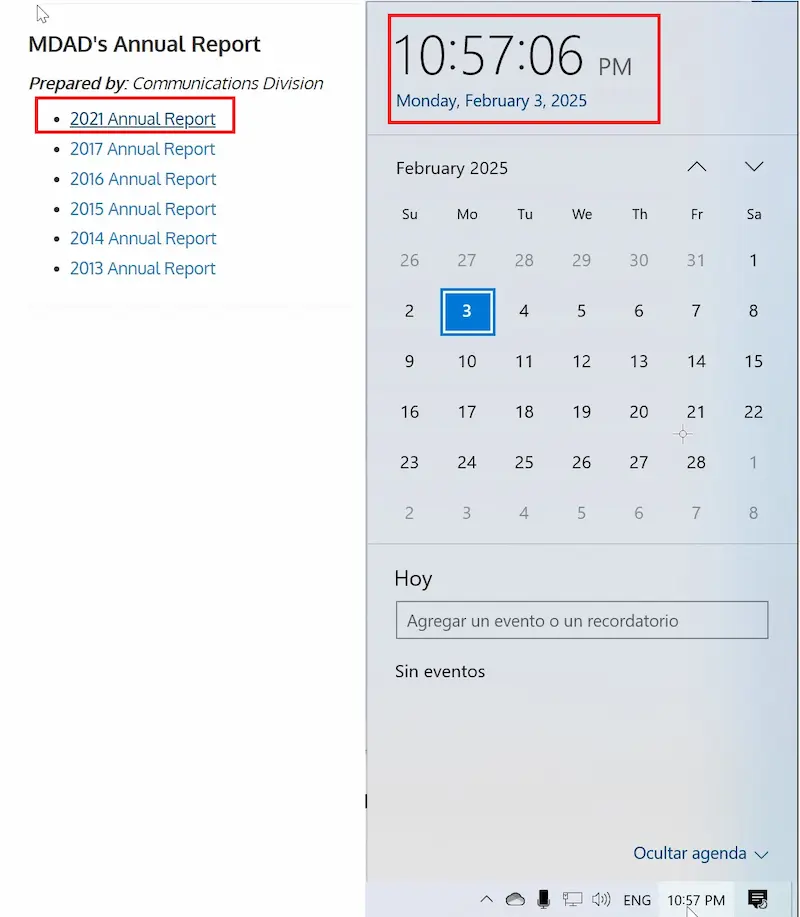
II. Infrastructure Crisis: An Airport on the Brink of Collapse
Errors and Deficiencies in Miami International Airport’s Management: Director Ralph Cutié’s Report Analysis
The recent announcement by Miami International Airport (MIA) Director Ralph Cutié reveals multiple administrative mistakes and structural failures that have impacted airport operations. Despite promises of $7 billion investments to modernize MIA, persistent issues highlight a lack of oversight and strategic planning from Mayor Daniella Levine Cava, the County Commission, and the Airport Director himself.
Below are the detected errors in MIA’s management and planning, which should be incorporated into the comprehensive analysis of its infrastructure and administrative crisis:
1. Multi-Billion Investment vs. Years of Neglect
Director Ralph Cutié mentioned that the current $7 billion investment aims to “end decades of disinvestment,” confirming that the airport has operated with deteriorating infrastructure for years.
Detected Errors:
- If MIA generates a $32 billion annual economic impact, why was it neglected for decades?
- Since 2019, $5.6 billion was approved for improvements, yet works were delayed even before the pandemic.
- Cutié attributed the lack of investment to COVID, but the infrastructure crisis dates back much earlier.
- There was no effective planning to continue improvements post-pandemic, leading to accelerated deterioration.
2. Lack of Transparency in Contract Execution and Reporting
One of the most serious issues is the lack of transparency in contract execution and supervision.
Detected Errors:
- Progress reports on projects have been inconsistent and do not comply with Ordinance 19-122.
- There was no clear explanation as to why critical contracts were not executed on time.
- The elevator and escalator maintenance contract switched providers multiple times over eight years, contributing to the lack of preventive maintenance.
Example:
- In 2017, Kone Elevator abandoned the contract, triggering a chain of contractors without maintenance stability.
- Oracle won a bid but lost the contract due to security violations.
- Schindler took over in 2022 and found units 30-40 years old without proper maintenance.
This demonstrates a failure in effectively supervising the quality of contracted services.
3. Skytrain Crisis and Delayed Response
The closure of the Skytrain in September 2023 due to structural cracks in 5 of the 130 pillars highlights the lack of maintenance and monitoring of critical infrastructure.
Detected Errors:
- The Skytrain’s structural problem did not appear overnight, indicating a lack of timely preventive inspections.
- Routine inspections were relied upon instead of conducting regular structural evaluations.
- The director mentioned the Skytrain would be out of service for 10 months, reflecting poor planning for temporary solutions.
Comparison with Surfside and the FIU bridge: If the risk was so severe, why weren’t solutions implemented earlier?
This reflects a lack of proactive management and a reactive rather than preventive culture.
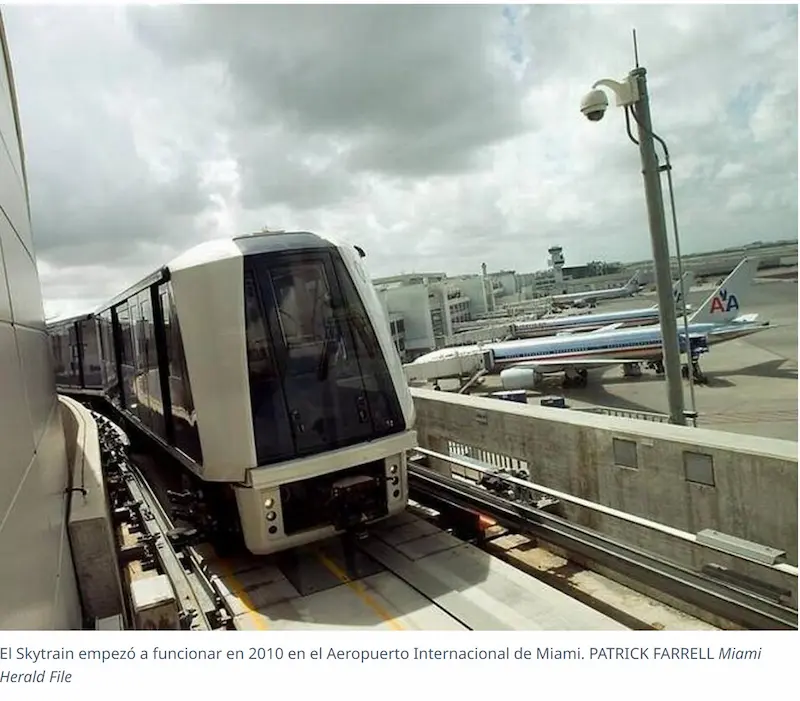
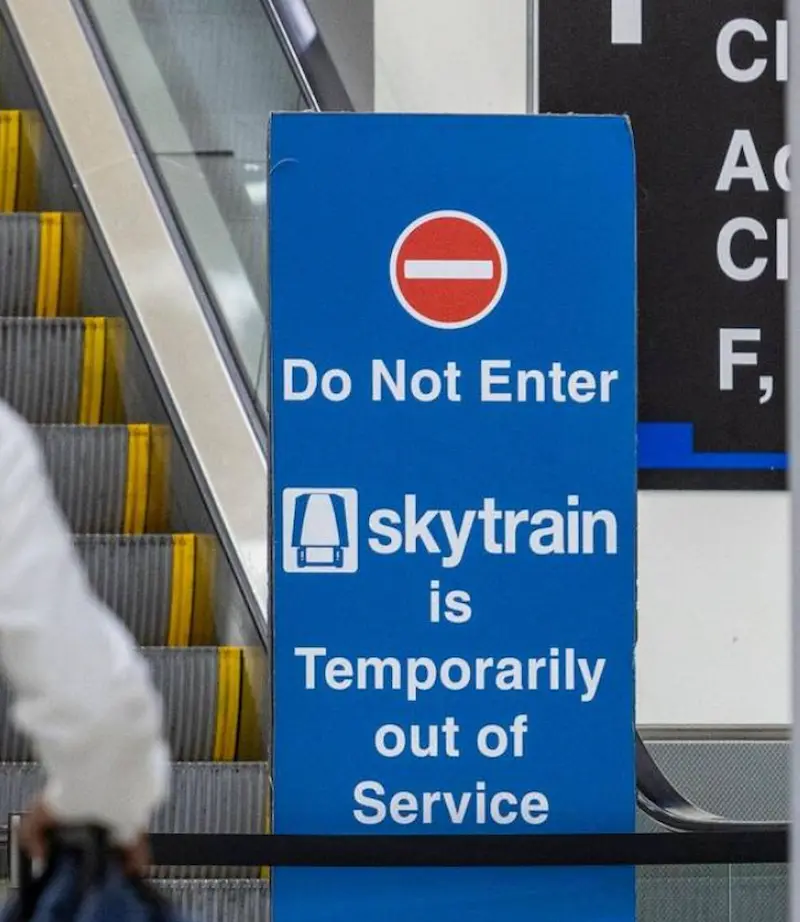
4. Escalators, Elevators, and Restrooms in Poor Condition
The MIA modernization program includes the renovation of 616 mechanical units (elevators, escalators, moving walkways) and 447 restrooms. However, delays have caused a collapse in passenger experience.
Detected Errors:
- Out of 616 mechanical units, 50 are out of service, representing more than 8% inoperability.
- Schindler’s $581 million, 10-year contract (with an option to extend for 5 more years) only allows for the renewal of 30-45 units per year, meaning the problem will persist for years.
- Out of 447 airport restrooms, only 40 have been renovated, 9 are under construction, and 18 are awaiting permits, leaving 380 restrooms still in poor condition.
- The director mentioned that construction permits take a month, revealing an internal bureaucracy that slows down improvements.
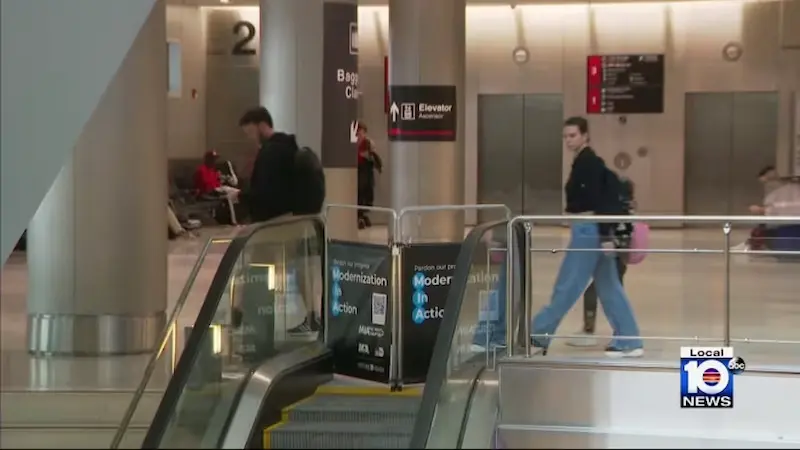

5. Boarding Bridge Modernization with Excessive Delays
MIA has 128 boarding bridges, many of which are 30-40 years old. According to Director Cutié, only 34 have been replaced, and 10 more are planned for bidding soon.
Detected Errors:
- The renovation process is extremely slow given the number of deteriorated bridges.
- There is no clear strategy to accelerate this project, leaving passengers at risk.
- If glass is more weather-resistant and reduces corrosion, why wasn’t this standard implemented earlier for the bridges?
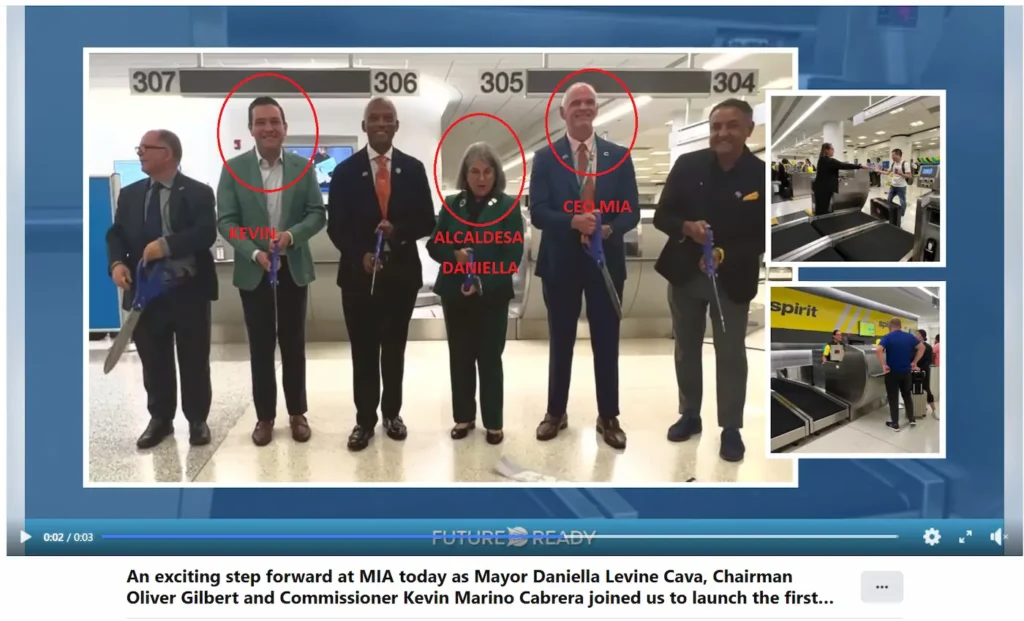
6. Bidding Processes and Expansion Projects with Unacceptable Completion Dates
The director announced several expansion projects:
- New employee parking lot (2,250 spaces) – To begin in 2024.
- South Terminal Expansion (6 boarding gates) – Completion by 2029.
- Central Terminal Renovation – Completion by 2030.
Detected Errors:
- These projects should have been planned much earlier.
- There are no indications of a plan to expedite these works despite increasing air traffic.
- The airport expects to handle 77 million passengers by 2040, but infrastructure will barely be ready by then.
This demonstrates that strategic decisions are being made too late, compromising the airport’s future growth.
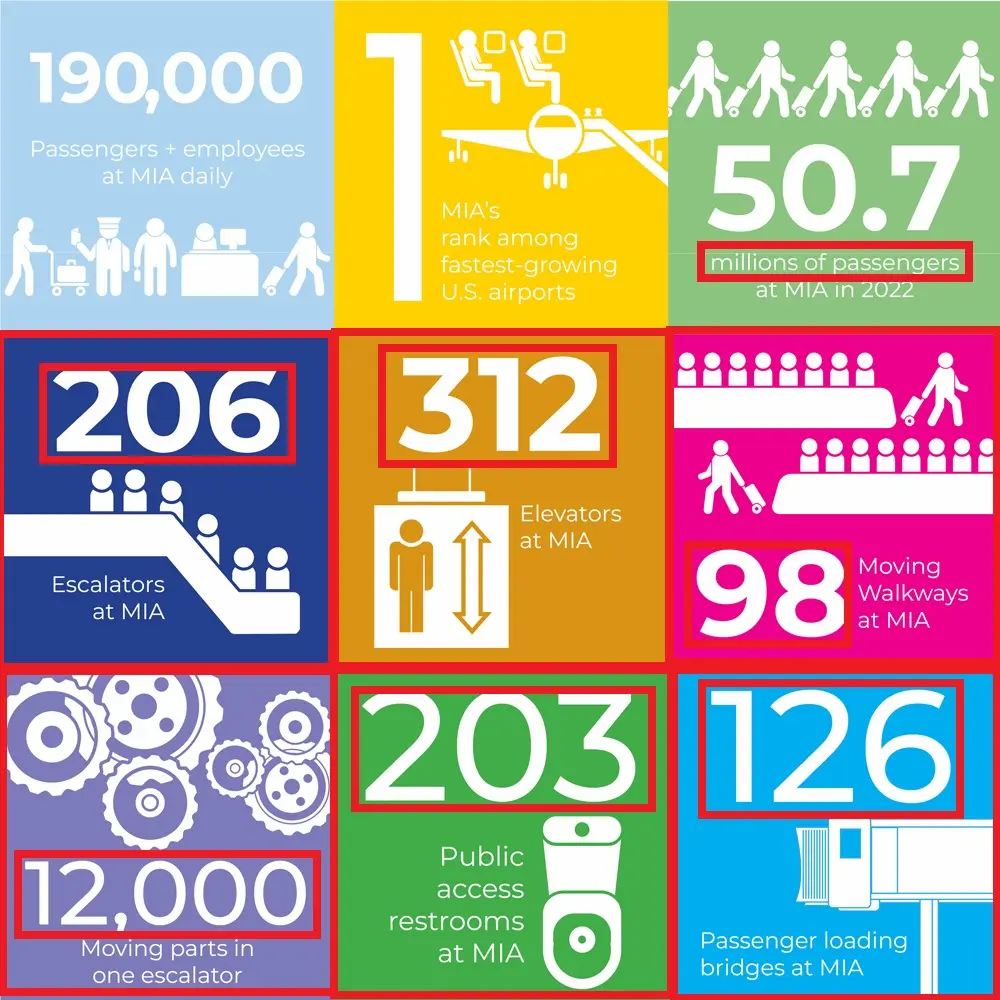
Edificio 3090: An Invisible Electrical Hazard
- Obsolete emergency generator (over 50 years old) replaced by a rented one, incurring additional costs of $1.2 million annually.
- Collapsed battery system and exposed electrical components, posing a fire risk.
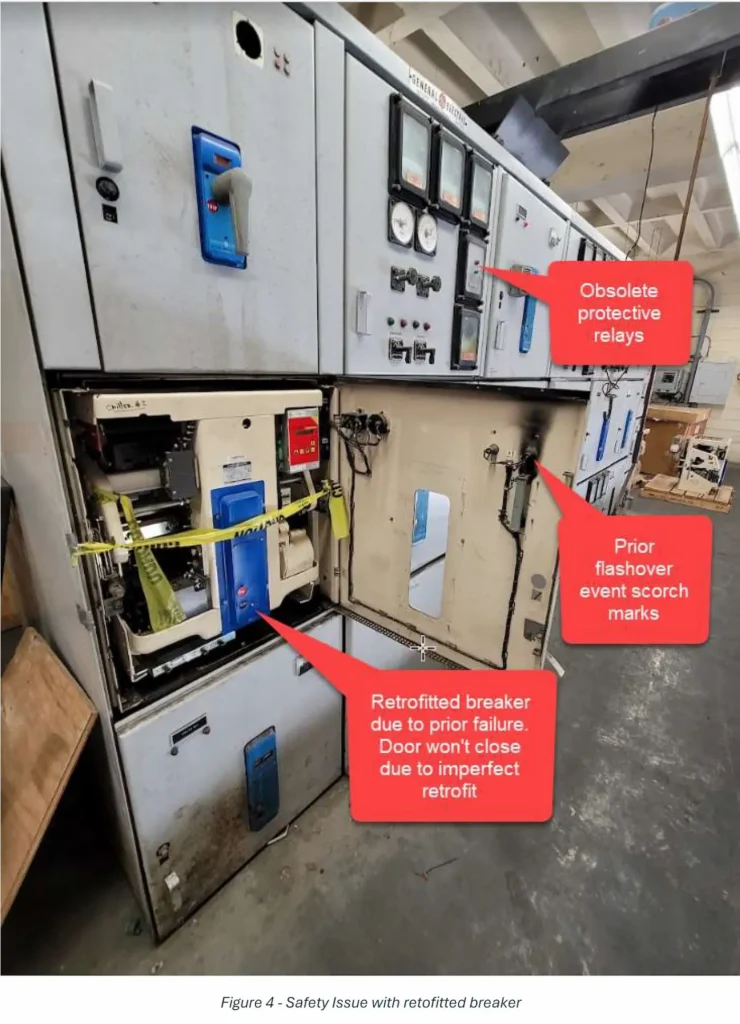
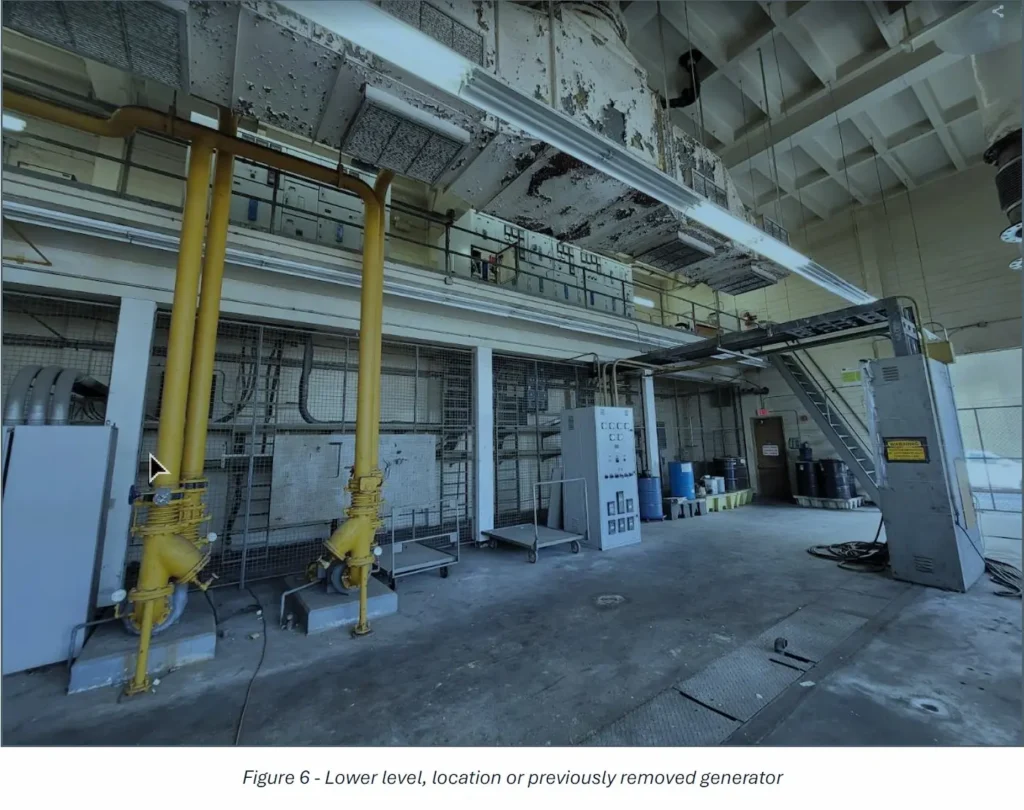


III. Failed Governance: Leadership Inaction
1. Directly Responsible Parties
- Ralph Cutié (MIA Director):
- With 12 years at the airport and 4 as CEO, despite his experience in project management ($123 million annually), he ignored:
- Preventive maintenance for the Skytrain.
- Technical alerts regarding Building 3090 since 2021.
- With 12 years at the airport and 4 as CEO, despite his experience in project management ($123 million annually), he ignored:
- Mayor Daniella Levine Cava and the Board of Commissioners:
- Four years of weekly meetings with no results: No prioritization of technical inspections or demand for accountability.
- Violation of Ordinance 19-122: Monthly project reports omitted budget deviations and critical delays.
2. Pattern of Negligence
- Zero Maintenance:
- Temporary corrective fixes instead of preventive/predictive maintenance (e.g., installing sensors on the Skytrain).
- $6.8 million spent on emergency repairs between 2022 and 2024.
- Culture of Secrecy:
- Million-dollar contracts kept undisclosed; budgets edited behind closed doors.
IV. Crisis at Miami Airport: Questionable Contracts and Safety Risks
Miami-Dade faces criticism after recommending contracts with aviation companies that have accumulated serious safety violations. Of the six companies shortlisted to operate at Miami International Airport (MIA), five have alarming records of “serious” OSHA citations, including fatal accidents and systemic failures.
One of the most severe cases involves Worldwide Flight Services, whose subsidiary was fined after an employee was crushed to death by a forklift in Boston in 2023, in addition to violations at MIA such as storing gasoline in water bottles. Other companies, such as EULEN America (16 citations for exposure to infectious materials and pests) and G2 Secure Staff (a worker killed by machinery in 2019), are also on the list.
Despite these backgrounds, the County’s Strategic Procurement Department approved the proposals, arguing that they evaluate “corporate responsibility” through compliance reviews. However, critics point out that the lack of rigor in the selection process—including the omission of specific safety certification plans for MIA—could worsen the airport’s operational crisis, already under scrutiny for maintenance and repair delays.
Update: The county assured that the contracts have not yet been approved and that it “considers all OSHA citations” during the evaluation process. Nevertheless, the situation highlights a pattern of risks in the management of the region’s main economic engine.
V. Consequences and Lessons Unlearned
Impact on Miami-Dade:
- Loss of Public Trust:
- 67% of users rated MIA as “poor” in 2024 surveys.
- Economic Risk:
- The airport generates thousands of jobs, but its deterioration threatens tourism investments.
Urgent Recommendations:
- State Intervention:
- External audit of the Board of Commissioners due to conflicts of interest.
- Independent Accounting Court:
- Monitor capital projects and fund usage.
- Leadership Renewal:
- Replacement of key officials with a track record of inaction.
Conclusion: An Airport, A Symbol of Mismanagement
MIA is not just a decaying infrastructure—it embodies a political system consumed by complacency. While leaders hold ceremonial meetings, passengers endure closed restrooms, executives avoid transparency, and contractors operate in obscurity. The real question isn’t how did we get here? but how long will this impunity last?
Sources:
Key Errors Identified:
✅ Decades of maintenance neglect prior to the pandemic
✅ Constant contractor changes without ensuring service stability
✅ Lack of transparency in contract execution and violations of Ordinance 19-122
✅ Delayed responses to the deterioration of the Skytrain and other critical infrastructures
✅ Modernization plans with excessively late completion dates
Urgent Recommendations:
🔹 Conduct monthly internal audits of critical infrastructure
🔹 Accelerate bidding processes and eliminate bureaucracy in construction permits
🔹 Establish stricter standards for contractor supervision to prevent maintenance failures
🔹 Implement more effective contingency plans to avoid prolonged service closures
🔹 Improve accountability and ensure transparent publication of progress on the airport’s website
Final Conclusion:
The Miami International Airport is in crisis due to years of accumulated errors and a lack of effective oversight. The administration must take urgent steps to efficiently modernize infrastructure and prevent the airport from continuing to collapse under the pressure of increasing passenger volumes.
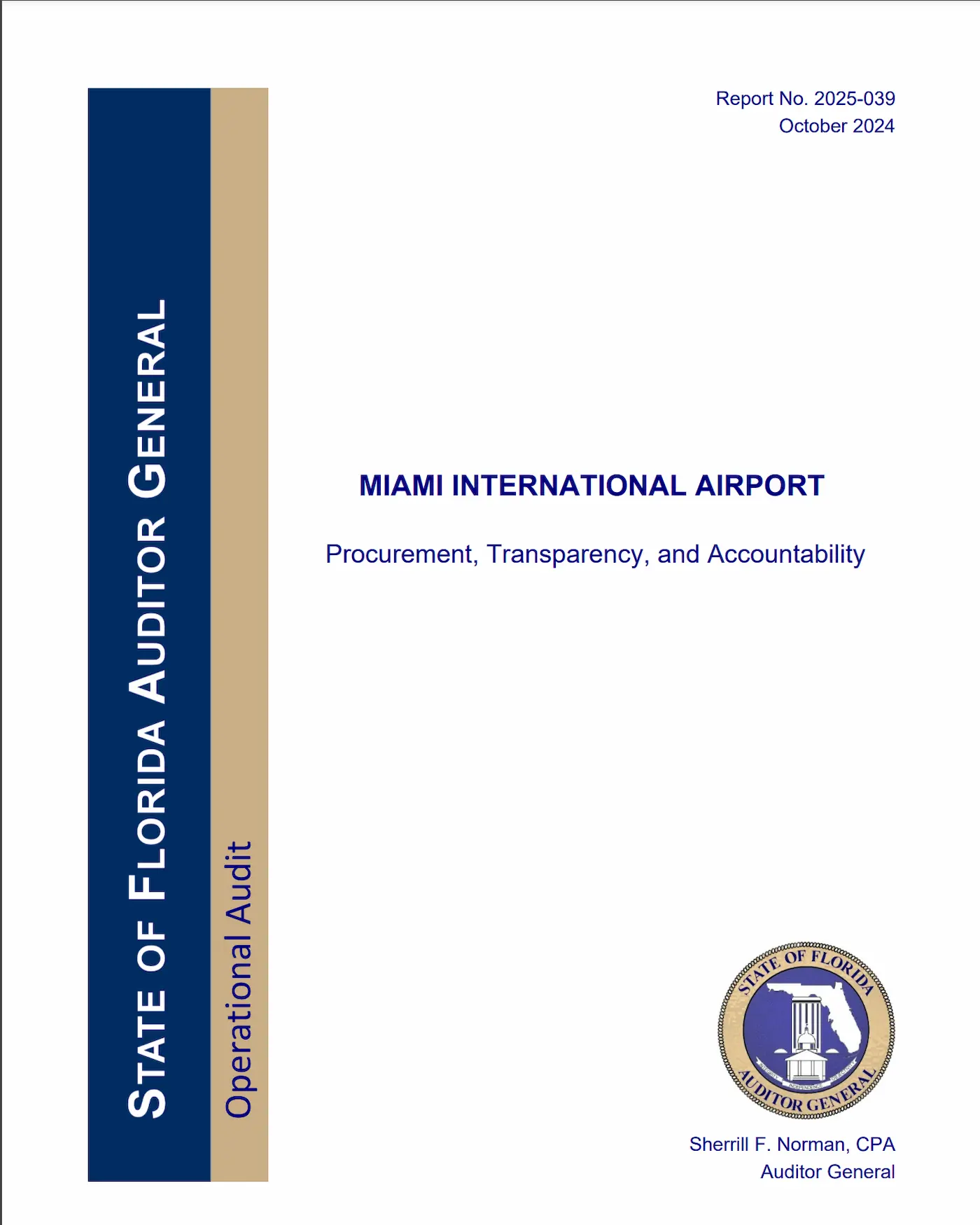
https://flauditor.gov/pages/pdf_files/2025-039.pdf
Miami-Dade County Mayor, Board of County Commissioners, and Miami-Dade Aviation Department Chief Executive Officer
During the period October 2022 through January 2024, Daniella Levine Cava served as the Miami-Dade County Mayor, Ralph Cutié served as the Miami-Dade Aviation Department Chief Executive Officer, and the following individuals served on the Miami-Dade Board of County Commissioners:
Oliver G. Gilbert, III, Chairman Anthony Rodriguez, Vice Chairman Marleine Bastien from 11-8-22 Micky Steinberg from 11-8-22 Kevin M. Cabrera from 11-8-22
Roberto J. Gonzalez from 11-23-22 a
Keon Hardemon Eileen Higgins Raquel A. Regalado
Danielle Cohen Higgins Kionne L. McGhee Juan Carlos Bermudez René Garcia
Jean Monestime to 11-7-2022 Sally A. Heyman to 11-7-2022 Rebeca Sosa to 11-7-2022
a Commissioner position vacant at the beginning of the period through 11-22-22.
The team leader was Javier Alfonso and the audit was supervised by Ramon L. Bover, CPA.
Please address inquiries regarding this report to Derek Noonan, CPA, Audit Manager, by e-mail at dereknoonan@aud.state.fl.us or by telephone at (850) 412-2864.
This report and other reports prepared by the Auditor General are available at: FLAuditor.gov
Printed copies of our reports may be requested by contacting us at:
State of Florida Auditor General
Claude Pepper Building, Suite G74 · 111 West Madison Street · Tallahassee, FL 32399-1450 · (850) 412-2722
MIAMI INTERNATIONAL AIRPORT PROCUREMENT, TRANSPARENCY, AND ACCOUNTABILITY
SUMMARY
Pursuant to Section 11.45(2)(m), Florida Statutes,1 this operational audit of the Miami-Dade Board of County Commissioners’ (BCC) administration of the Miami International Airport (Airport) included an assessment of the Airport’s compliance with Section 332.0075, Florida Statutes; Chapter 287, Florida Statutes; and the public records and public meeting laws of Florida. Our audit’s assessment of such compliance disclosed the following:
Finding 1: Contrary to State law, the BCC did not always promptly post BCC meeting minutes, Airport budgets, and commodities or contractual services contracts exceeding $325,000 to the Airport’s Web site.
Finding 2: The BCC should enhance its policies and procedures to ensure that the 14 elected officials annually receive the ethics training required by State law.
Finding 3: The BCC had not established policies and procedures to ensure that purchasing agents file the statements of financial interests required by State law.
BACKGROUND
The Miami International Airport (Airport) was founded in 1928 and is located on 3,230 acres of land near downtown Miami.
During the fiscal year ended September 30, 2023, the Airport served 51.5 million passengers and reported total revenues of $1.2 billion and total expenses of $1.1 billion. In addition, according to the Federal Aviation Administration, the Airport ranked 9th among United States airports in enplanements for the 2023 calendar year.2 As of March 2024, the Airport employed 1,337 individuals.
The Mayor and Miami-Dade Board of County Commissioners (BCC), composed of 13 County Commissioners, are elected officials charged with governance over the Airport. The Miami-Dade Aviation Department (MDAD) is responsible for Airport operations pursuant to BCC ordinances3 and employs an Airport Chief Executive Officer, who is responsible for the day-to-day administration, management, and operation of the Airport in accordance with policies established by the Mayor and BCC.
The Mayor and BCC’s purposes and powers include:
- Coordination of the planning, financing, construction, and operation of the Airport.
1 Section 11.45(2)(m), Florida Statutes, requires that, at least once every 7 years, the Auditor General conduct an operational audit of each large-hub commercial service airport. “Large-hub commercial service airport” is defined as a publicly owned airport that has at least 1 percent of the annual passenger boardings in the United States as reported by the Federal Aviation Administration.
2 The Federal Aviation Administration extracts passenger (enplanement) data from the Air Carrier Activity System (ACAIS), a database that contains passenger boarding data.
3 Miami-Dade County Ordinance No. 73-8, adopted February 6, 1973, established the MDAD to be responsible for the administration of Airport operations.
- Promotion of safe and efficient air commerce.
- Correlation of Airport projects with other aviation projects in the region, State, and nation.
- Development of public airports to support and enhance economic development in Miami-Dade County, Florida.
This operational audit focused on selected Airport processes and administrative activities, specifically, the Airport’s procurement, transparency, and accountability practices.
FINDINGS AND RECOMMENDATIONS
Finding 1: Transparency
State law4 requires each governing body of a commercial service airport to establish and maintain a Web site to post information relating to the operation of the airport, including but not limited to:
- The official minutes of each meeting of the governing body, which shall be posted within 7 business days after the date of the meeting in which the minutes were approved.
- The approved budget for the commercial service airport for the current fiscal year, which shall be posted within 7 business days after the date of adoption.
- Any contract or contract amendment for the purchase of commodities or contractual services executed by or on behalf of the commercial service airport in excess of the threshold amount provided in State law,5 which shall be posted no later than 7 business days after the commercial service airport executes the contract or contract amendment.
Our review of the Airport Web site and related BCC and Airport records in March 2024 disclosed the following:
- The Airport Web site includes a link to the BCC Web site, which includes the official meeting minutes of the BCC. Our review disclosed that the minutes for 3 of the 44 BCC meetings held during the period October 2022 through January 2024 were posted 31, 32, and 35 business days after the BCC approved the minutes, or 24, 25, and 28 days late, respectively. In response to our inquiries, BCC personnel indicated that the BCC ordinances and policies and procedures did not establish a specific timeframe for posting meeting minutes and that, subsequent to our inquiries, procedures were updated and implemented to comply with State law.
- The 2023-24 fiscal year Airport budget was adopted by the BCC on September 21, 2023, and posted to the Airport’s Web site on October 23, 2023, 22 business days after the date of adoption, or 15 days late. Airport personnel indicated that, although the adopted budget was sent to the Information Technology Department on September 28, 2023, for posting on the Web site, due to an oversight, the budget was not posted timely.
- The Airport Web site provides a link to the BCC Web site where contracts executed by or on behalf of the Airport for the purchase of commodities or contractual services exceeding $325,000 are posted. During the period October 2022 through January 2024, the Airport had 112 active contracts exceeding $325,000 and totaling $1.43 billion. We reviewed the BCC Web site to determine whether 43 selected contracts totaling $755.4 million were timely posted. Our review disclosed that 22 of the contracts totaling $560.9 million had not been posted to the BCC Web
4 Section 332.0075(2), Florida Statutes.
5 Section 332.0075(1))(f), Florida Statutes, specifies that the threshold amount is for category five as provided in Section 287.017, Florida Statutes. During the audit period, the category five threshold was $325,000.
site. According to Airport personnel, they were not aware that the contracts had not been posted to the BCC Web site. Subsequent to our inquiries, BCC personnel posted the 22 contracts to the BCC Web site in April 2024, 30 to 1,002 days, or an average of 310 days, after the contracts were executed.
The untimely postings to the Airport and BCC Web sites constitutes noncompliance with State law and reduces the transparency and accountability of Airport operations.
Recommendation: The BCC and the Airport should establish policies and procedures to ensure that all meeting minutes, the adopted budget, and the applicable contracts and contract amendments are timely posted to the Airport or BCC Web sites, as applicable. Such policies and procedures should establish responsibility for timely posting the information to the Airport or BCC Web sites to one or more specified individuals. We also recommend that Airport personnel verify that all active contracts executed by or on behalf of the Airport for the purchase of commodities or contractual services exceeding $325,000 are posted as required by State law.
Finding 2: Ethics Training
State law6 requires that beginning January 1, 2021, each member of a governing body of the commercial service airport must complete 4 hours of ethics training each calendar year. The training must address, at a minimum, Section 8, Article II of the State Constitution; the Code of Ethics for Public Officers and Employees; and the public records and public meetings laws of the State of Florida. Similarly, BCC ordinances7 require each elected official to complete a 2-hour ethics course offered by the Miami-Dade County Commission on Ethics and Public Trust (MDC Commission on Ethics) and submit a certificate of completion to the Clerk of the Board.
According to MDC Commission on Ethics records, the 14 elected officials completed the MDC Commission on Ethics’ course. However, our review of the ethics course conducted by the MDC Commission on Ethics and discussion with County personnel disclosed that the course did not meet all the ethics training requirements in State law. Specifically:
- Although the ethics course addressed the public records and public meetings laws of the State of Florida, the course did not address Section 8, Article II of the State Constitution and the Code of Ethics for Public Officers and Employees.
- Rather than the 4 hours of ethics training required by State law, the BCC-required ethics course was only 2 hours in length.
- Rather than each calendar year, the BCC-required ethics course was to be completed every 2 years.
In addition, although required every 2 years, we noted that 6 of the 14 elected officials had most recently completed the MDC Commission on Ethics’ course during the 2-year period May 2022 through April 2024.
Our audit procedures also disclosed that 1 elected official had completed ethics training offered by an external course provider in December 2023. That training met the requirements in State law.
6 Sections 332.0075(4)(b) and 112.3142(2)(b), Florida Statutes.
7 Section 2-11.1(bb), Miami-Dade County Code of Ordinances.
In response to our inquiries, BCC personnel indicated that the MDC County Code of Ethics and BCC ordinances had not been updated to include all the topics required by State law to be addressed or to require the training be 4 hours in length and completed annually. Subsequent to our inquiries, during the period April 2024 through July 2024, 9 more of the elected officials completed the State law-required ethics training through an external course provider.
Absent completion of the required 4 hours of ethics training each calendar year, the BCC cannot demonstrate compliance with State law and members of the governing body of the Airport may not fully understand their legal obligations and the implications of their decisions.
Recommendation: BCC ordinances should be updated to require the Mayor and Commissioners to complete ethics training annually. In addition, the BCC should request that the MDC Commission on Ethics update its ethics course to be 4 hours in length and include all required topics enumerated in State law or, alternately, establish procedures to ensure that the elected officials complete the State law required training through an external course provider.
Finding 3: Statements of Financial Interests
State law8 requires that local officers, including purchasing agents having the authority to make any purchase exceeding $35,000 on behalf of the Airport, shall file a statement of financial interests with the supervisor of elections no later than July 1 of each year. Statements of financial interests are required by State law9 and are important in that they provide a public record that discloses the financial interests, activities, and associations of purchasing agents, which may identify potential conflicts of interest.
Each year, pursuant to State law,10 the Florida Commission on Ethics (COE) prepares and provides each supervisor of elections with a list of the names and addresses of purchasing agents required to file statements of financial interests for the previous year. To assist the COE, governmental entities are required to provide the names and addresses of purchasing agents required to file statements of financial interests.
Our examination of Airport records and discussion with Airport personnel disclosed that the Airport had not established policies and procedures that designate the employee responsible for periodically providing to the COE the names and addresses of local officers, including purchasing agents having the authority to make any purchase exceeding $35,000 on behalf of the Airport, required to file statements of financial interests. In addition, our examination of Airport records identified two purchasing directors and seven purchasing agents with the authority to make purchases exceeding $35,000 on behalf of the Airport during the period October 2022 through January 2024. We contacted the Miami-Dade County Supervisor of Elections to determine whether the two purchasing directors and seven purchasing agents filed the required statement of financial interests for the 2022 calendar year and found that, although the two purchasing directors had filed the required statements, the seven purchasing agents had not filed the required statements as of June 2024. In response to our inquiries, Airport personnel indicated that
8 Section 112.3145(1) and (2), Florida Statutes.
9 Section 112.31445, Florida Statutes.
10 Section 112.3145(8)(a)1., Florida Statutes.
the Airport failed to report the purchasing agents to the COE because they were not aware that purchasing agents were required to file statements of financial interests.
Absent the required statements of financial interests, there is an increased risk that the Airport may be unaware of potential conflicts of interest when entering into contracts and other agreements. Purchasing agents who do not timely file the required statements of financial interests fail to comply with State law and may be subject to fines.
Recommendation: The Airport should establish policies and procedures that designate the employee responsible for periodically providing to the COE the names and addresses of local officers, including purchasing agents having the authority to make purchases exceeding $35,000 on behalf of the Airport, required to file statements of financial interests. The policies and procedures should also require that the designated employee contact the Miami-Dade Supervisor of Elections to verify that the purchasing agents timely filed the statements as required.
OBJECTIVES, SCOPE, AND METHODOLOGY
Section 11.45(2)(m), Florida Statutes, provides that, every 7 years, the Auditor General shall conduct an operational audit of each large-hub commercial service airport. The audit is to include, at a minimum, an assessment of compliance with State law,11 and compliance with the public records and public meetings laws of Florida. The term “large-hub commercial service airport” means a publicly owned airport that has at least 1 percent of the annual passenger boardings in the United States as reported by the Federal Aviation Administration.
We conducted this operational audit from February 2024 through July 2024 in accordance with generally accepted government auditing standards. Those standards require that we plan and perform the audit to obtain sufficient, appropriate evidence to provide a reasonable basis for our findings and conclusions based on our audit objectives. We believe that the evidence obtained provides a reasonable basis for our findings and conclusions based on our audit objectives.
This operational audit of the Miami-Dade Board of County Commissioners’ (BCC) administration of the Miami International Airport (Airport) focused on procurement, transparency, and accountability. For the areas addressed by this audit, our objectives were to:
- Evaluate management’s performance in establishing and maintaining internal controls, including controls designed to prevent and detect fraud, waste, and abuse, and in administering assigned responsibilities in accordance with applicable laws, administrative rules, contracts, grant agreements, and other guidelines.
- Examine internal controls designed and placed in operation to promote and encourage the achievement of management’s control objectives in the categories of compliance, economic and efficient operations, the reliability of records and reports, and the safeguarding of assets, and identify weaknesses in those internal controls.
- Determine the extent to which the Airport has complied with Section 332.0075, Florida Statutes and Chapter 287, Florida Statutes.
- Identify statutory and fiscal changes that may be recommended to the Legislature pursuant to Section 11.45(7)(h), Florida Statutes.
11 Section 332.0075, Florida Statutes, and Chapter 287, Florida Statutes.
This audit was designed to identify, for those programs, activities, or functions included within the scope of the audit, weaknesses in management’s internal controls; instances of noncompliance with applicable laws, rules, regulations, contracts, grant agreements, and other guidelines; and instances of inefficient or ineffective operational policies, procedures, or practices. The overall objective of this audit was to identify problems so that they may be corrected in such a way as to improve government accountability and efficiency and the stewardship of management. Professional judgment has been used in determining significance and audit risk and in selecting the particular transactions, legal compliance matters, records, and controls considered.
As described in more detail below, for those programs, activities, and functions included within the scope of our audit, our audit work included, but was not limited to, communicating to management and those charged with governance the scope, objectives, timing, overall methodology, and reporting of our audit; obtaining an understanding of the program, activity, or function; identifying and evaluating internal controls significant to our audit objectives; exercising professional judgment in considering significance and audit risk in the design and execution of the research, interviews, tests, analyses, and other procedures included in the audit methodology; obtaining reasonable assurance of the overall sufficiency and appropriateness of the evidence gathered in support of our audit findings and conclusions; and reporting on the results of the audit as required by governing laws and auditing standards.
Our audit included transactions, as well as events and conditions, occurring during the period October 2022 through January 2024, and selected Airport actions taken prior and subsequent thereto. Unless otherwise indicated in this report, these transactions and records were not selected with the intent of projecting the results, although we have presented for perspective, where practicable, information concerning relevant population value or size and quantifications relative to the items selected for examination.
In conducting our audit, we:
- Reviewed applicable laws, rules, BCC and Airport policies and procedures, and other guidelines, and interviewed Airport personnel to obtain an understanding of applicable processes and administrative activities and the related requirements.
- In March 2024, examined the Airport and BCC Web sites to determine whether they contained information required by Section 332.0075, Florida Statutes, including:
- Properly noticed Board meetings and meeting agendas for the period October 2022 through January 2024.
- Minutes from the 44 BCC meetings that occurred during the period October 2022 through January 2024 posted within 7 days of approval.
- Approved Airport budgets for the 2022-23 and 2023-24 fiscal years posted to the Airport Web site within 7 days after the date of adoption.
- The Airport Master Plan.
- A link to all required Airport financial and statistical reports on the Federal Aviation Administration Web site.
- Contracts and contract amendments exceeding $325,000 posted to the Airport Web site no later than 7 business days after execution. Specifically, from the population of 112 applicable contracts and contract amendments executed during the period October 2022 through
January 2024 and totaling $1.4 billion we selected 43 contracts and contract amendments totaling $755.4 million to determine whether the documents were timely posted.
- Annually updated position title, position description, and annual or hourly compensation rates information for the Airport’s 1,337 employees.
- Evaluated and determined whether the elected officials and Airport employees received ethics training required by Section 332.0075(4)(a) and (b), Florida Statutes.
- Examined Airport, BCC, and Florida Commission on Ethics records to determine whether Board members and other officials required to complete financial disclosure forms pursuant to Section 112.3145, Florida Statutes, had completed and filed their financial disclosure forms for the 2022 calendar year. We also evaluated whether the reported information identified any business relationships that could represent potential conflicts of interest.
- Compared Airport vendor records to the Department of State’s Division of Corporations Web site to identify potential related-party transactions or conflicts of interest.
- Verified that the BCC submitted required Airport-related information to the Florida Department of Transportation pursuant to Section 332.0075(5)(a), Florida Statutes.
- From the population of 112 contracts and contract amendments exceeding $325,000 and totaling
$1.4 billion during the audit period:
- Examined Airport records related to 30 selected contracts totaling $639 million to determine whether the goods and services were competitively selected in accordance with applicable laws, BCC ordinances, policies and procedures, and good business practices and the procurements were properly authorized.
- Reviewed BCC meeting minutes and agendas for 24 contracts that individually exceeded
$1.5 million and totaled $635 million, to determine whether the contracts were approved as separate meeting agenda line items in accordance with Section 332.0075(3)(b)2., Florida Statutes, rather than being included in the consent agenda.
- From the population of 40 construction projects with contracts and contract amendments exceeding $325,000 and totaling $78.1 million during the audit period, selected 10 projects totaling $46.7 million and examined related Airport records to determine whether the plans and specifications were properly reviewed and approved, architects and engineers were properly selected, all change orders were approved, appropriate insurance and bonds were furnished, and construction projects were properly inspected.
- Reviewed the Airport’s June 2023 $45 million land purchase, the only land purchase during the audit period, to determine whether the Airport properly acquired the land in accordance with BCC ordinances, policies, and procedures.
- Examined Airport records, including BCC meeting minutes, for the period October 2022 through January 2024, and inquired of Airport personnel, to determine whether any construction or electrical projects with estimated or actual costs exceeding the thresholds specified in Section 255.20, Florida Statutes, were performed using Airport services, employees, and equipment.
- Reviewed Airport records and inquired of Airport personnel to determine whether the Airport made any expenditures or entered into any contracts utilizing the authority granted by a declared state of emergency that has either expired or exceeded 1 year.
- Reviewed the 2021-22 fiscal year and 2022-23 fiscal year Facility Inspection Reports for the Miami-Dade Aviation Department to determine whether the Airport had best practices in place for building, life safety, fire safety, and sanitation standards, as required by Airport debt covenants.
- Communicated on an interim basis with applicable officials to ensure the timely resolution of issues involving controls and noncompliance.
- Performed various other auditing procedures, including analytical procedures, as necessary, to accomplish the objectives of the audit.
- Prepared and submitted for management response the findings and recommendations that are included in this report and which describe the matters requiring corrective actions. Management’s response is included in this report under the heading MANAGEMENT’S RESPONSE.
AUTHORITY
Pursuant to the provisions of Section 11.45, Florida Statutes, I have directed that this report be prepared to present the results of our operational audit.
Sherrill F. Norman, CPA Auditor General
Want more post like this?
Head over to our homepage for the latest updates from South Florida and beyond:











